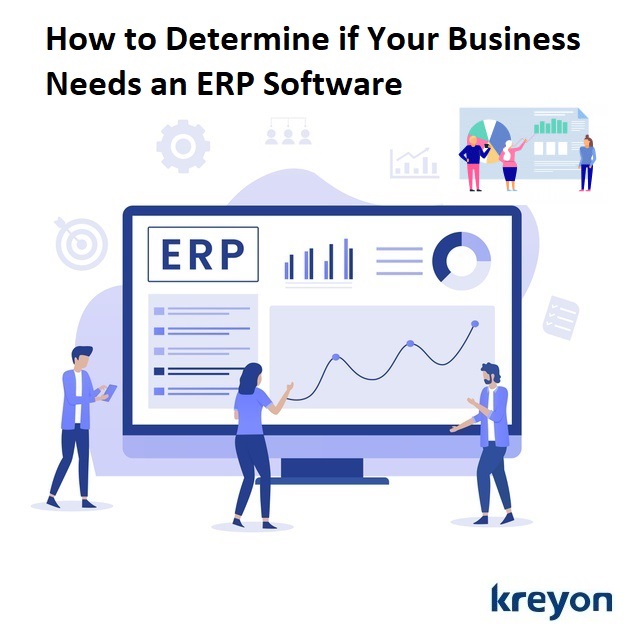How to Determine if Your Business Needs an ERP Software

An ERP report by Panorama Consulting revealed that after ERP implementation, 49% of organisations said they improved all business processes. Only 5% of businesses said they did not improve business processes. An integrated software for running a company is becoming a basic necessity in the digital age today.
The employees prefer to work for companies that have the freedom to work from anywhere and clients need access to data at all times. An ERP software can integrate all business processes, clients, vendors, human resources, manufacturing of products/services, manage supply chain and accounting & finances in a single system. The cloud ERP makes it easy to make the data accessible from any location.
The report revealed that the top two problems noted during implementation were inadequate testing and inadequate business process reengineering. While 95% of the businesses saw business process improvement after ERP implementation. Most companies benefit from an ERP software, however, not all organisations need it. If you are a start-up with meagre resources, spending on ERP may not be an urgent priority. Here’s a look at some of the tell tell signs that your company needs an ERP:
1. Tedious Excel Sheets & Google Docs
Is your company relying on tedious excels and Google sheets for processes? Are you relying on it for employee updates, leaves, salary etc? How are your vendor/customer relationships managed? Many companies use excel sheets for reporting and data purposes. They even make their employees fill up tedious excels that result in waste of time and valuable resources.
An ERP system can streamline processes for various business functions and provide smooth operational structures. The reporting, communication and overall business processes can be managed using an ERP. The system can also integrate business hierarchies, departments and data into a single software to provide all relevant information to all concerned.
2. No Integrated System for Data

Relying on different sources of data & various applications can be messy. Many times, when there is failure to integrate information, it can lead to duplication of efforts. There are redundancies, out of date information, incomplete integration of systems leading to communication issues and ultimately no single source of truth for the organisation.
An ERP system is the best bet for an organisation to streamline its data. By integrating legacy components and other applications, the ERP can provide all the information needed to run an organisation better.
3. Customized Reports
When organisations use different systems, finding the right reports can be a bit cumbersome. Managing various departments, employees and business functions can be chaotic. The excels and documents may fail to capture the specifics of business processes as per the company needs.
With an ERP system, the company can create customised reports, configure dashboards as per the employee roles and departments, it can also provide timely insights for important actions. The reports can be customized and scheduled as per the needs of the company with an ERP software.
The ERP software can create customised reports with web data connectors across different applications, integrate with Google docs, excels etc. The ERP system can be used for cleaning up, structuring & presenting data as per the business needs.
4. Business Coordination

Is your business relying on too many tools and technologies for operations? Are your day to day needs getting more complex due to disparate tools for communication? How do you stay on top of the data from every department, employee, vendors, inventory & customers?
With ERP, the complete supply chain of your business efficiently, process times can be improved and data can be centralised leading to better outcomes for your company. Right from the time, a product or service is manufactured to the time it reaches the customer, everything can be streamlined with an ERP. The after sales support, coordination with vendors and managing complete business operations can be done seamlessly with an ERP.
5. Too Many Software & Apps
Many companies find it hard to integrate information across various software applications. They use different systems and best of breed applications, but sometimes integrated views of business is hard to achieve for them. The businesses also feel overwhelmed to manage the complex user based licensing procurement from different vendors. A CRM from one vendor, support system from another vendor & then accounting/finance application from a different vendor, and then legacy data in old applications can lead to integration issues.
Your ERP system can manage all the business processes and also the integrations with ease. It can provide the comprehensive functionality and the customisations needed to address issues for your business.
6. Working Capital & Finance

When a company is operating without a centralised system and control, it can often lead to leakage of capital. Take for e.g. an average company spends a significant amount of money to cover its regulatory compliances. Many of these companies also spend money on penalties, inefficiencies & redundancies. But with an ERP, the organisation can have access to a centralised accounting system. The working capital needs of a company can be regulated and optimised with an ERP system.
Compliance and regulatory reporting is a critical business function for companies. An ERP creates standardized processes for employees, vendors, customers, accounting, regulatory and compliance reporting. The company can enforce budgets and stricter controls with respect to finances for improved bottom line results.
7. Company Growth & Performance
Are your business processes optimised for best performance? How do you measure the performance of your organisation? Is your company looking for growth? Do you want to ensure standard processes across business functions and locations? Many times, when a company is growing, it leads to chaos, mismanagement and regulatory hurdles. ERP can solve this.
As per the ERP Report, 64% companies opt for an ERP implementation for improving their business performance. They want to position their company for growth and improved performance. An ERP gives a balanced view of the business data and projections for the future. It leads to better planning, coordination, communication and improved performance across the company.
The ERP implementation can be complex for companies that need a very high level of customisations, causing longer implementation cycles & higher budgets. But, over 91% of companies don’t need a lot of customisations and can use ERP systems without significant changes leading to improved business performance.
Kreyon Systems is a leading ERP Software implementation partner for companies. If you have any queries for us or need help in implementation of ERP Software, please reach out to us.
